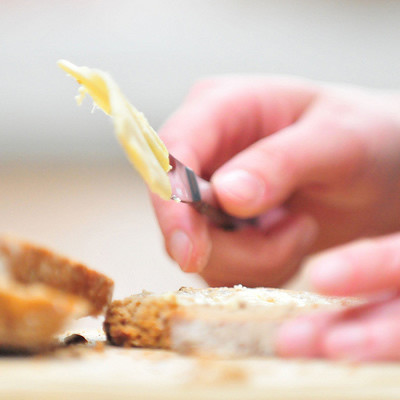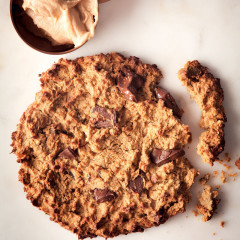Eat a high-fat, low-carb diet for exercise performance? That advice is probably the opposite of anything you may have been told previously. It does not initially make sense because we know that exercising muscles burn carbohydrates (“carbs”) in the form of glucose. When our glucose is depleted, we become exhausted. That is why we have always been told to follow “high-carb, low-fat” diets when exercising. We are also told that dietary fat is easily stored. For many of us the whole point of exercise is to reduce our body-fat stores. So why would we want to put fat into our bodies, only to then try to burn it off? Despite these paradoxes, there is a growing movement among both weight-conscious exercisers and serious athletes to do exactly that, and with great results. Here are some possible reasons why.
THE SCIENCE BIT: BURNING FAT VS BURNING CARBS
Sport scientists can quite easily measure if your body is choosing to burn fat or carbohydrate by assessing your respiratory exchange ratio (RER). For most people, the biggest predictor of what your body is burning is the meal you had just before doing the measurement. If you had bread, the RER will indicate that you are burning carbs. If you had a high-fat meal such as olives, you are probably burning fat. Yes, by keeping your intake of carbs appropriately low, and fats higher, our bodies can stay in a fat-burning mode for longer.
Applying this information to exercise, the graph opposite shows how our bodies draw off different energy sources under moderate exercise conditions. After one hour of training, our bodies are deriving energy equally from fat and carbohydrates. At this stage, the glucose stored in the muscles (glycogen) is the main source of carbs. Increasing blood glucose levels with energy drinks and carb supplements may reduce the amount of fat burned to fuel the exercise. This is important information for people focusing on exercise for fat loss, as well as endurance athletes who are doing base training.
 With longer period of training, it is clear that the depletion of muscle glycogen is an increasingly important factor. On a traditional high carb diet, the athlete becomes increasingly dependent on supplements to replenish blood sugar levels. This often requires carefully planned supplement regimens, and packing an array of carbo-drinks, corn-starch polymers and cereal bars for the event. Failure to manage sugar levels may lead to uncomfortable bloating when sugar levels drop. With arduous high-volume exercise, oral supplements cannot maintain energy requirements. The replenishment of muscle glycogen is challenging on multi-day events, or for people doing very high-volume training such as for triathlons, Iron Man and Cape Epic-type events.
With longer period of training, it is clear that the depletion of muscle glycogen is an increasingly important factor. On a traditional high carb diet, the athlete becomes increasingly dependent on supplements to replenish blood sugar levels. This often requires carefully planned supplement regimens, and packing an array of carbo-drinks, corn-starch polymers and cereal bars for the event. Failure to manage sugar levels may lead to uncomfortable bloating when sugar levels drop. With arduous high-volume exercise, oral supplements cannot maintain energy requirements. The replenishment of muscle glycogen is challenging on multi-day events, or for people doing very high-volume training such as for triathlons, Iron Man and Cape Epic-type events.
THE CASE FOR DROPPING CARBS
In my experience, some high-training-volume athletes may prefer to drop their carb levels for a combination of three main reasons. Firstly, practically, they are often highly functional people on tight schedule and consuming the amount of carbohydrates (especially whole grains) required may be very time-consuming. I often get the complaint “But I feel like I’m eating the whole day”; “My stomach is permanently bloated”, or “All those carbs make me feel drowsy all day”.
The second reason is an extension of the first. The ideal is to follow a health-promoting, natural diet that excludes refined sugars and supplements. These diets include the “Paleo” movements including Prof Tim Noakes’ “Original Eaters”. For these athletes the answer may lie in reducing bulky whole grains and refined sugars, and replacing them with natural, healthy oils. This is not a new idea, and was popularised by Barry Sears Zone Diet, which prescribed a 40% fat intake, with excellent results.
The third reason for dropping carbs is the most interesting and challenging. Intelligent athletes have noted the energy gap presented by falling muscle glycogen levels. Instead of trying to fill the gap with carbo drinks, they have asked if it is possible to fill it by increasing their muscles’ ability to oxidise fats. This would have multiple advantages. Even a very lean body can easily store fat energy to sustain high volume exercise. Fat burns at a steady rate and does not subject you to energy highs and lows. Fatty foods are very energy efficient and are easily digested and transported. With options including nuts, seeds, biltong, olives and cheeses, they taste great, too.
Scientific tests have shown that for some athletes it is possible to almost double their ability to oxidise fats. According to James Smith Ph.D. at the Sport Science Institute of South Africa, individual results are highly variable. Some athletes have dramatic improvements in performance, while others may experience symptoms such as increased perceived exertion, which prevents them from training without carbs.
There is still much debate around adaptation to low-carb training. Most studies involve dietary change for days or weeks, while many athletes competing on low-carb, high-fat (LCHF) diets claim that their adaptation happened over a period of up to one year. In my own experience, some athletes take to LCHF immediately, while others fare better on a more gradual introduction. It is always advised to seek professional advice in drawing up your personal LCHF programme, and always get medical clearance before making any dietary or lifestyle changes.
*Rael Koping is a dietician with a long history in sports nutrition. He has advised WP bodybuilding, Stormers and WP rugby teams, several PSL soccer teams and many national and international level athletes.






Comments